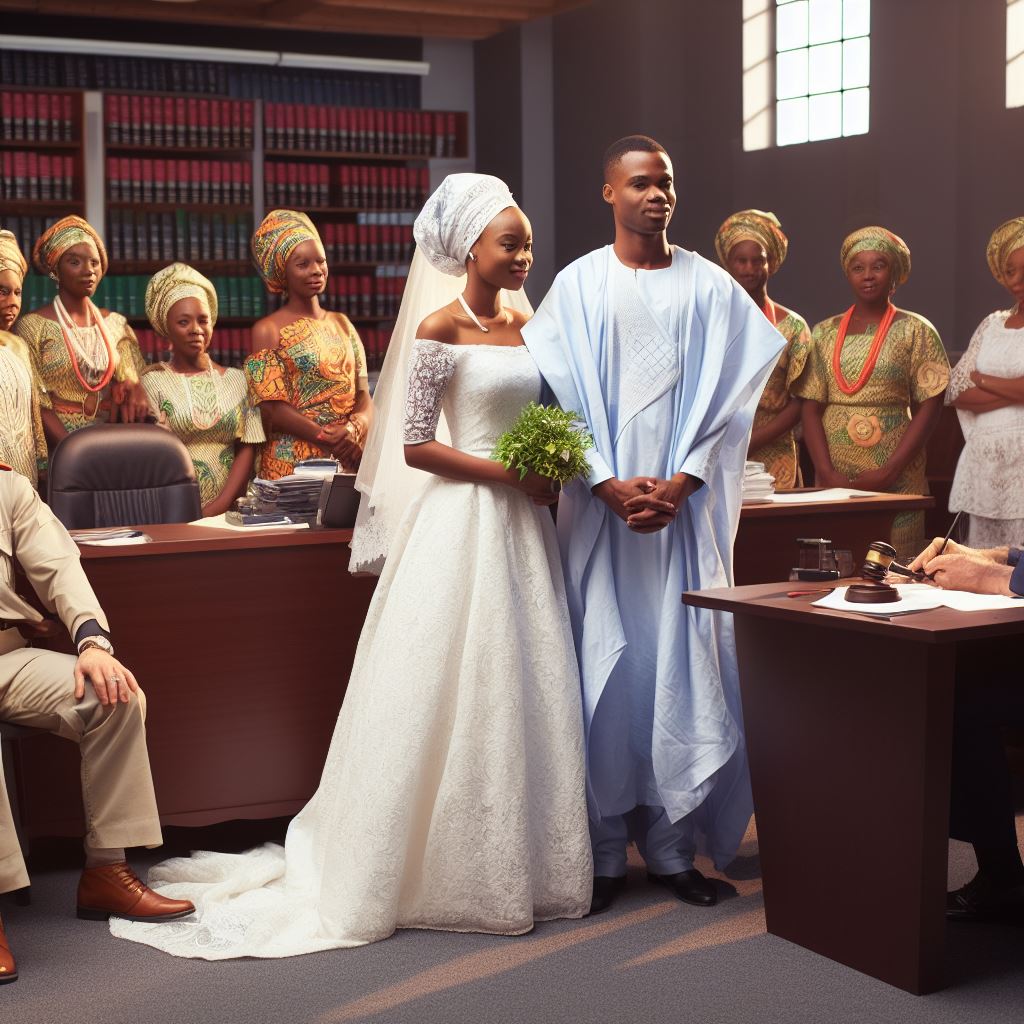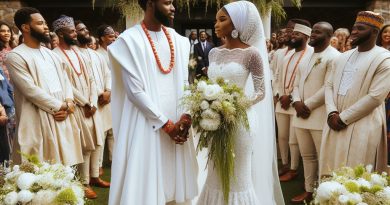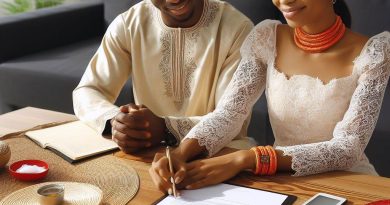The Role of Witnesses in Statutory Marriages: Nigeria’s Perspective
Last Updated on October 16, 2023
Introduction
The Role of Witnesses in Statutory Marriages is crucial, as they actively confirm the marriage’s legality and authenticity, thereby solidifying the union.
Nigeria’s viewpoint on the role of witnesses brings forth a fascinating interplay between cultural traditions and legal mandates, providing insight into the nation’s rich history.
Nigerian statutory marriages demand the presence of witnesses to attest to the marriage’s validity, protecting the rights and interests of all parties involved.
The essence of witnesses transcends mere formality; it safeguards the integrity of the marriage process and ensures the parties’ consent is genuine.
This blog post delves into the intricacies of the witness system in Nigerian statutory marriages, highlighting its importance and how it mirrors the country’s cultural values.
We will explore the legal obligations imposed on witnesses, their qualifications, and the significance of their presence during the marriage ceremony.
Additionally, we will analyze the influence of societal norms and the impact of these witnesses on the durability and recognition of the marriage within the Nigerian context.
As we embark on this journey, we will unravel the intricate tapestry of witnesses in Nigerian statutory marriages and how their roles are integral to the sanctity of unions in this diverse and vibrant nation.
Legal Requirements for Witnesses in Statutory Marriages in Nigeria
The statutory marriage process in Nigeria
The Marriage Act governs all marriages in Nigeria, making it essential for statutory marriages in Nigeria.
It is a formal and legally recognized union between two individuals.
Legal requirement of witnesses during the marriage ceremony
During the marriage ceremony, witnesses play a crucial role in validating the marriage.
They must attend and sign the marriage certificate to affirm their presence and consent to the marriage.
Number of witnesses required by law
According to Nigerian law, two witnesses are required to be present during the marriage ceremony.
These witnesses must be of sound mind and have attained the age of 18 years or above.
Witnesses ensure the lawful marriage by confirming consent from both parties.
They act as impartial observers to ensure the legality and authenticity of the marriage.
Eligibility criteria for witnesses
In addition to being of legal age, the witnesses must also possess certain qualifications.
They should be individuals who possess a good understanding of the English language, as the marriage certificate is written in English.
This ensures that they can fully comprehend the content and purpose of the document.
Furthermore, the witnesses should not be under any legal disabilities that would prevent them from fulfilling their role.
They should not be mentally incapacitated, intoxicated, or under the influence of drugs or alcohol during the ceremony.
The witnesses should also be individuals with no conflict of interest or bias towards either party in the marriage.
They should not be relatives of the couple or have any personal interest in the outcome of the marriage.
This ensures the impartiality and integrity of their role as witnesses.
Basically, witnesses have a significant role in statutory marriages in Nigeria.
They validate the marriage by their presence and consent, ensuring that it is conducted in accordance with the law.
Their eligibility criteria, including age, mental capacity, language proficiency, and lack of conflict of interest, ensure the integrity and legality of the marriage process.
Read: Legal Requirements for Valid Marriages Under Nigerian Law
Duties and Responsibilities of Witnesses in Statutory Marriages
Witnessing the exchange of consent between the couple
- Witnesses play a crucial role in confirming that the couple willingly and freely entered into marriage.
- They are present during the exchange of vows, ensuring that consent is given.
- By witnessing the exchange of consent, they validate the marriage as legally binding.
Signing the marriage register as witnesses
- After the exchange of consent, witnesses are required to sign the marriage register.
- Their signatures serve as proof that they were present and witnessed the marriage.
- This documentation is necessary for the legal recognition of the marriage.
Presence during the entire marriage ceremony
- Witnesses must be in attendance from the beginning to the end of the marriage ceremony.
- Their continuous presence ensures that all legal requirements are fulfilled.
- They are responsible for verifying the identities of the couple and their witnesses.
Understanding their role in the legal validity of the marriage
- Witnesses should be aware that their presence and participation are vital for the marriage to be legally valid.
- They should understand the importance of their role in upholding the legal integrity of the marriage.
- By fulfilling their duties and responsibilities, they contribute to the legitimacy of the union.
Generally, witnesses in statutory marriages in Nigeria have specific duties and responsibilities.
They witness the exchange of consent, sign the marriage register, remain present throughout the ceremony, and understand their role in upholding the legal validity of the marriage.
Their active involvement is crucial for the successful and legally recognized union of the couple.
Read: Marriage Act in Nigeria: Implications for Interfaith Couples
Importance of Witnesses in Statutory Marriages
Ensuring the authenticity and legality of the marriage
Having witnesses present during a statutory marriage is crucial in ensuring the authenticity and legality of the union.
The presence of witnesses adds credibility and validity to the marriage contract.
Providing evidence of the couple’s intention to marry
Witnesses play a vital role in providing evidence that the couple has the intention to enter into a legal marriage.
Their presence serves as proof that both parties willingly consented to the union.
Preventing fraudulent marriages or marriages under duress
Witnesses actively deter fraudulent marriages by confirming the voluntary nature of the union, preventing coercion or fraud.
Upholding the integrity of the institution of marriage
By requiring witnesses, statutory marriages uphold the integrity of the institution of marriage.
Witnesses act as guardians of the sanctity of marriage, bearing witness to the commitment made by the couple and ensuring the solemnity of the bond.
Essentially, witnesses play a vital role in statutory marriages in Nigeria.
Their presence ensures the authenticity and legality of the union, provides evidence of the couple’s intent to marry, prevents fraudulent or coerced marriages, and upholds the integrity of the institution of marriage.
Without witnesses, the institution of marriage would be vulnerable to abuses and invalid unions. Therefore, their presence is crucial in safeguarding the sanctity of marriage in Nigeria.
Read: How the Marriage Act in Nigeria Affects Property Rights

Challenges Faced by Witnesses in Statutory Marriages
Unwillingness or fear of individuals to serve as witnesses
- Some individuals may be unwilling to serve as witnesses in statutory marriages.
- Fear of potential legal or social consequences may discourage people from being witnesses.
- Lack of understanding about the responsibilities and duties of witnesses can also contribute to unwillingness.
Lack of awareness about the importance of witnesses in statutory marriages
- Many people are not aware of the role witnesses play in statutory marriages.
- Lack of information contributes to the underestimation of witness importance.
- Without witnesses, the validity and legality of the marriage can be called into question.
- Educating the public about the significance of witnesses is crucial to overcome this challenge.
Issues related to witness eligibility and credibility
- For a witness to be eligible, they must be of legal age and mentally sound.
- Witnesses with criminal records or a questionable reputation may face credibility issues.
- The credibility of witnesses can be challenged, leading to doubts about the marriage’s legality.
- Verifying the eligibility and credibility of witnesses is essential for ensuring the integrity of statutory marriages.
Legal consequences for those who falsely act as witnesses
- Some individuals may falsely act as witnesses for statutory marriages for personal gain.
- Falsely acting as a witness is a criminal offense in Nigeria, with potential legal repercussions.
- Imposing strict penalties can deter individuals from falsely fulfilling the role of a witness.
- Enforcing the consequences for those who falsely act as witnesses is crucial to maintaining the legitimacy of statutory marriages.
In general, witnesses in statutory marriages face several challenges that hinder their participation.
The unwillingness or fear of individuals to serve as witnesses, along with the lack of awareness about their importance, poses significant obstacles.
Additionally, issues related to witness eligibility and credibility can undermine the validity of marriages.
However, legal consequences for those who falsely act as witnesses can help deter fraudulent activities.
Overcoming these challenges is pivotal to ensuring the smooth functioning of statutory marriages in Nigeria.
Read: Understanding Nigeria’s Marriage Act: A Comprehensive Guide
Ways to Address Challenges and Promote the Role of Witnesses
In Nigeria, the role of witnesses in statutory marriages is crucial.
However, challenges often hinder their participation.
To address these issues effectively, several strategies can be employed:
Raising Awareness Through Public Campaigns and Education
- Conduct nation-wide awareness campaigns about the significance of witnesses in statutory marriages.
- Develop informative brochures and pamphlets to distribute in communities.
- Organize workshops and seminars in collaboration with local authorities and non-governmental organizations.
- Integrate witness education into the school curriculum, promoting a culture of responsibility.
Implementing Stricter Eligibility Criteria for Witnesses
- Establish clear guidelines on who can qualify as a witness.
- Enforce age requirements, ensuring witnesses are of legal age to understand the commitment.
- Verify the witness’s identity and legal status to prevent fraudulent involvement.
- Encourage witnesses to seek legal advice before committing to their role.
Offering Protection and Incentives to Encourage Witness Participation
- Provide legal protection against potential repercussions for witnesses.
- Offer tax incentives or nominal financial rewards to offset their time and effort.
- Establish a witness support network, including counseling services.
- Recognize exemplary witnesses with public acknowledgment.
Collaborating with Religious and Community Leaders
- Engage religious leaders to discuss the importance of witnesses in marriages during sermons.
- Encourage traditional leaders to incorporate witness responsibilities into cultural ceremonies.
- Facilitate dialogues between community leaders and government representatives.
- Create a platform for these leaders to publicly endorse and promote witness participation.
By implementing these strategies, Nigeria can strengthen the role of witnesses in statutory marriages and ensure their active involvement in the process.
This, in turn, will contribute to the legitimacy and effectiveness of statutory marriages in the country.
Conclusion
Witnesses are vital in statutory marriages as they actively validate the union, ensuring its legality and authenticity within Nigeria.
Nigeria’s perspective on witness involvement in marriage is rooted in legal tradition. It emphasizes the significance of witnesses, underlining the seriousness of the marital contract.
In a nutshell, enhancing the role of witnesses in Nigeria’s context is crucial.
It bolsters the institution of marriage, promotes accountability, and upholds the sanctity of this essential societal bond.
We must collaboratively educate the public on the role’s significance and carefully select witnesses, emphasizing their pivotal position in uniting couples.
By doing so, Nigeria can further strengthen its family and marital structure and continue to uphold its rich legal and cultural traditions.


